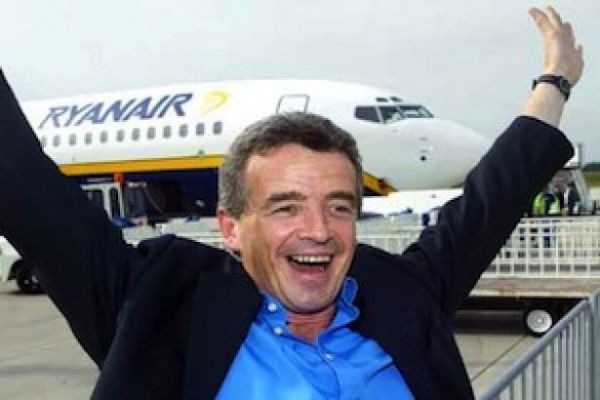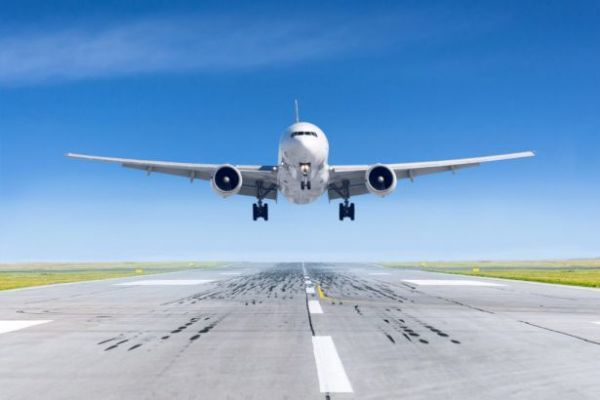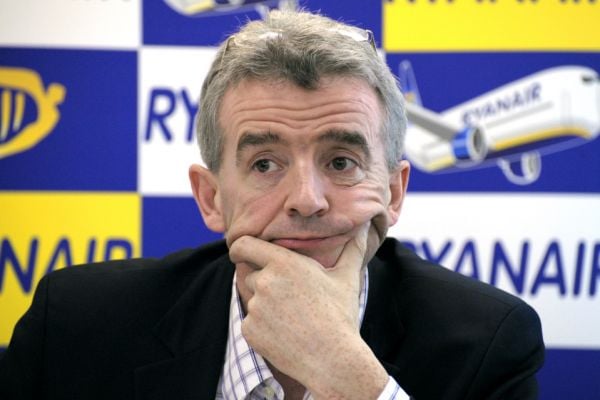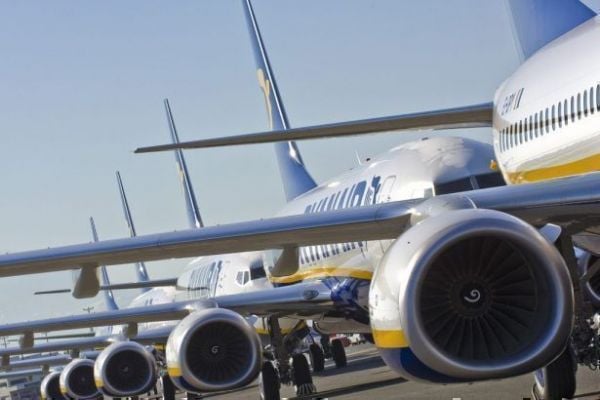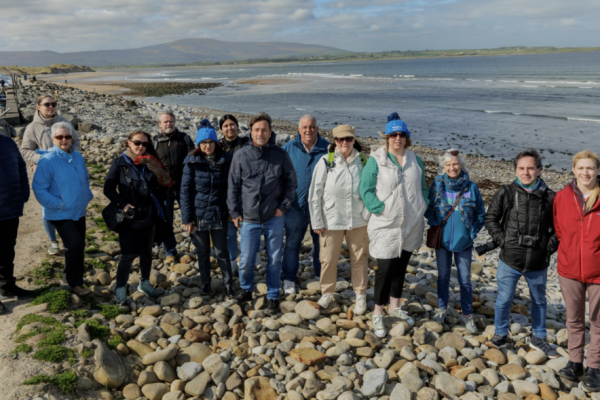Ryanair Holdings surprised investors by sticking to its fiscal 2017 profit forecast with a plan to lower fares to lure more passengers even as Britain’s decision to quit the European Union and a string of terrorist attacks in major European markets weigh on demand.
Europe’s largest discount airline plans to carry 117 million passengers in the 12 months through March 2017, 10 percent more than a year ago and 1 million more than its previous target. The Dublin-based company intends to draw customers away from competitors, predicting ticket prices will drop as much as 12 percent in the second half of its fiscal year, compared with a projected 8 percent drop in the first half.
With more passengers expected, Ryanair stuck to its target for fiscal 2017 net income to rise to at least €1.38 billion, even though the Brexit vote poses “significant risks to the downside during the remainder of the year,” the Irish company said Monday. Shares rose as much as 7.2 percent, the most since Sept. 9.
Remain Campaign
Ryanair, which campaigned for the U.K. to stay in the EU with newspaper ads and in-flight announcements, will cut back on frequencies at London Stansted, its biggest base, this winter, shifting capacity mainly to eastern Europe. While it said Britain doesn’t yet face route cuts, about 50 jets due for delivery this year are set to be deployed in other markets to offset an anticipated travel slump.
“The important thing is that guidance is unchanged,” said Mark Simpson, an analyst at Goodbody in Dublin, adding that Ryanair’s plans to remove capacity out of Stansted is a good sign of the carrier’s flexibility. “They did a little bit better than we thought” in the fiscal first quarter.
Net income in the three months ended June 30 increased 4.5 percent to 256 million euros as an 11 percent jump in passenger numbers helped offset a 10 percent decline in ticket prices, according to a company statement. The shares were up 5.5 percent at 11.50 euros at 10:27 a.m. in Dublin, narrowing the loss for the year to 23 percent.
The weakening of the pound after the U.K. poll, combined with the impact of air traffic control strikes and the recent attacks in France and Germany, is set to compound price declines in the second quarter as Ryanair chases volumes at the expense of margins. The forecast for an 8 percent drop in fares in the first half is steeper than an earlier prediction of a decline of 5 percent to 7 percent.
“I only see risks to the downside,” Chief Financial Officer Neil Sorahan said in an interview. “We’ll stimulate the demand if we have to to get the passengers on the planes,” as a one-penny slump in the value of sterling against the euro translates into a drop of 8 million euros in after-tax profit.
Route Shift
Brexit’s impact will be difficult to measure until the end of 2017 at the earliest, Ryanair said in a statement. Contingency plans include shifting growth to eastern markets such as Poland, Romania, Lithuania and the Czech Republic, as well as to bigger western markets including Italy, Spain and Germany.
Out of its 1,800 routes only three are entirely within the U.K. and therefore directly at risk should Britain not be able to negotiate continued membership in the European open skies area, the CFO said. While Ryanair could seek a local air operating certificate to get around that problem, U.K. competitors such as EasyJet Plc would face a bigger challenge in flying to the EU.
EasyJet, Europe’s second-largest budget airline, last week shied away from a target for its fiscal year through September, as a terrorist attack in Nice on the French Riviera and the attempted coup in Turkey pressures ticket prices during the key summer travel season. Ryanair’s lower cost base puts it in a position to snap up opportunities, CFO Sorahan said.
Cost Cuts
Fares were already falling before the Brexit decision as low fuel prices encouraged airlines to add flights in pursuit of market share, while demand failed to keep pace with the supply increases. This month’s attacks in Nice and more recently in Germany, including an explosion in the Bavarian town of Ansbach Sunday, are set to cool ticket pricing further through the remainder of the year.
At Ryanair, lower fares were offset by a 4 percent decline in costs excluding fuel in the first quarter as the airline negotiated better deals at airports, reduced advertising spending and lowered financing costs, the company said.
“Every year has its challenges,” Sorahan said. “But if you’ve got the lowest cost base out there, you’re in a very strong position.”
News by Bloomberg, edited by Hospitality Ireland
